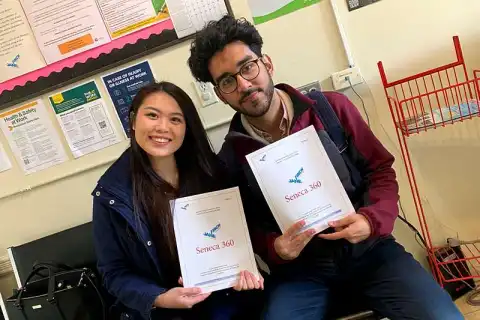Certificate - Mental Health Intervention
- 1 year
- Duration
- 19,386 CAD
- Price
- Rolling admission
- Start
- Rolling admission
- Deadline
- Certificate
- Degree
- Mixed
- Format
- Toronto / Canada
- Location
Program description
Those who work directly with clients or have just graduated from related programs can benefit from this eight-month certificate program that focuses on mental health intervention. In this course, you will learn about the theory and practice of family dynamics, community mental health, and crisis intervention, as well as the most recent research and its practical applications. You will also gain an understanding of risk factors, protective factors, and the applications of early intervention. You will be able to help those in need, both individuals and families, after completing this training.
In your second semester, you'll take a one-of-a-kind course called "Community Outreach," which will test your skills in coming up with novel approaches to the subject. Along with other students, you will be assigned a team to create unique modules that draw from established best practices in mental health outreach, prevention, and detection. Your goal will be to help spread awareness and understanding of mental health issues to a wider audience.
Program structure
Semester 1
- Introduction to Mental Health
- Diversity: Building Resilience
- Psychosocial Health
- Community Outreach
- Dynamics of the Family
Semester 2
- Trauma Methods and Practice
- Community Outreach II
- Crisis Counselling
- Health Promotion and Education
- Contemporary Issues in Community Mental Health
- Understanding Addiction
Price
Tuition fees - 19,386 CAD
Books and Supply Costs - 450 CAD
Please note: All costs are approximate, may vary by campus and are subject to change at any time without notice.
Requirements for applicants
Academic Requirements:
- Ontario university or college degree or college diploma or equivalent in community studies, health and public safety or a related program
English Proficiency Requirements:
If English is not your first language, show one of the following:
- Minimum of two years full-time study in an English-speaking nation
- Minimum one year of full-time postsecondary education in an English-speaking nation
- Successful completion of an intense English program like the English Language Institute
- English proficiency exam results from one of the international testing agencies. Only two-year-old tests are valid.
English language test score requirements
- CAEL CE and CAEL online - Minimum 60
- Cambridge English Exams (B2 First/FCE, C1 Advanced/CAE or C2 Proficiency/CPE) - Minimum 169 with no skill below 162
- Duolingo - Minimum score 105 to 110
- IELTS Academic - Minimum 6.0 with no skill below 5.5
- PTE Academic - Minimum score 58
- TOEFL iBT (including MyBest TOEFL and Home Edition) - Minimum 80 with no skill below 20
- TOEFL Revised Paper Delivered - No skill below 20
About the university

A public institution with many campuses in Peterborough, Ontario, and the Greater Toronto Area is called Seneca College of Applied Arts and Technology. At the bachelor, diploma, certificate, and graduate levels, it provides both full-time and part-time programs.
Seneca has been involved in foreign education for many years and today draws over 10,000 students from over 130 different nations each year. Through intense language instruction that may last anywhere from two months to more than a year, Seneca's English Language Institute helps overseas students become ready for post-secondary education. The college has a number of alliances with schools abroad and is growing its efforts in collaborative applied research and work/study abroad opportunities.
Seneca in a Nutshell
- With 30,000 full-time students and more than 70,000 registrations for continuing education each year, this institution is among the biggest in Canada.
- 7,000 foreign students from more than 150 nations make up a diversified student body.
- In terms of connections to other postsecondary institutions, Ontario colleges rank first.
- In Toronto, York Region, and Peterborough, there are ten campuses.
- Every year, on average, 8,000 bursaries and 2,600 Seneca scholarships/awards are given out.





